| |
The
Art Of The Trumpeter : Commentary On The Music Of Rob Blakeslee
by Frank Rubolino
January 2001
The world of jazz has been dominated by the saxophone for most of
the twentieth century's second half. Yes, Miles, Dizzy, and a host
of other significant trumpet players have left their indelible mark
on this wonderful art form with their enormous contributions; however,
it has been much more difficult for the brass players to capture the
imagination of the jazz fan when the competition from those playing
woodwinds has been so enormous.
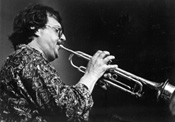 One trumpeter who has been fighting this uphill battle for 30 years
and who has produced a small but excellent body of work is Rob Blakeslee.
He started his career on the West Coast in 1970 and migrated from
there to Dallas, Texas in 1983 after having gotten exposure to the
international jazz scene through several tours in Europe. In Dallas
with Dennis Gonzales and his Daagnim label, he experienced his initial
recording opportunities, including his first as a leader titled 2100
New Orleans. Thereafter in 1987, he settled in Portland, Oregon
where he juggled a playing career with the teaching profession as
Director of Jazz Ensembles at Oregon State University through 1996.
It was this return to the West Coast and the associations that ensued
that proved the most fruitful. Blakeslee performed with the Northwest
Creative Orchestra in 1989 on the ambitious Anthony Braxton recording
Eugene on Black Saint. He was reunited with Vinny Golia, whom
he first met and sat in with in Austin, Texas in 1986, and thereafter
appeared on several Nine Winds releases with the multi-reed player.
Out of that union came three notable Nine Winds recordings under his
name, followed by his widely acclaimed release on Louie Records.
One trumpeter who has been fighting this uphill battle for 30 years
and who has produced a small but excellent body of work is Rob Blakeslee.
He started his career on the West Coast in 1970 and migrated from
there to Dallas, Texas in 1983 after having gotten exposure to the
international jazz scene through several tours in Europe. In Dallas
with Dennis Gonzales and his Daagnim label, he experienced his initial
recording opportunities, including his first as a leader titled 2100
New Orleans. Thereafter in 1987, he settled in Portland, Oregon
where he juggled a playing career with the teaching profession as
Director of Jazz Ensembles at Oregon State University through 1996.
It was this return to the West Coast and the associations that ensued
that proved the most fruitful. Blakeslee performed with the Northwest
Creative Orchestra in 1989 on the ambitious Anthony Braxton recording
Eugene on Black Saint. He was reunited with Vinny Golia, whom
he first met and sat in with in Austin, Texas in 1986, and thereafter
appeared on several Nine Winds releases with the multi-reed player.
Out of that union came three notable Nine Winds recordings under his
name, followed by his widely acclaimed release on Louie Records.
My first live exposure to Blakeslee occurred in 1999 in Antwerp,
Belgium while he was on tour with Golia doing their tribute to John
Carter. It was a memorable evening filled with happiness from the
music and sadness over the loss of Carter, a man who was so poignantly
in tune with the beauty on this earth yet so vividly aware of its
ugliness.
Here are a few comments on Rob Blakeslee's most recent recordings
as a leader:
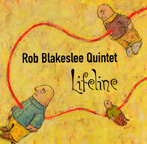 Lifeline,
Blakeslee's initial Nine Winds release as a leader is an amazing collaborative
effort. It includes Vinny Golia on baritone, soprano, wood flute,
and bass clarinet as a foil for Blakeslee's probing trumpet style.
Tad Weed is the pianist, Ken Filiano the bassist, and Billy Mintz
the drummer. The recording is dedicated to the memory of pianist Richard
Grossman, another unsung hero who posthumously is commanding much
attention. The magical qualities of Lifeline would certainly
have pleased Grossman. The recording builds through controlled tension,
moving with ease from structured openings to freeform intensity. There
is a constant outpouring of creativity from Blakeslee. It seems to
gush from his horn in huge gulps. His tone is fluid and flowing, yet
he switches effortlessly into segments with jagged edges that seem
to ignite the performance. He is a master at inserting the unexpected.
His lines intertwine with Golia's as they bounce ideas off each other.
Blakeslee's high-end trumpet counteracts with the lows from Golia's
baritone and bass clarinet to provide intricate sonic contrasts. The
fully motivating playing of Weed, Filiano, and Mintz adds a wealth
of richness to the set that never ceases to challenge with its complexly
woven fabric. Blakeslee set a standard with this release that marked
him as a trumpeter with great composing skills but more importantly,
a player who could take that framework and transform it into intriguing
improvised dynamics. Lifeline,
Blakeslee's initial Nine Winds release as a leader is an amazing collaborative
effort. It includes Vinny Golia on baritone, soprano, wood flute,
and bass clarinet as a foil for Blakeslee's probing trumpet style.
Tad Weed is the pianist, Ken Filiano the bassist, and Billy Mintz
the drummer. The recording is dedicated to the memory of pianist Richard
Grossman, another unsung hero who posthumously is commanding much
attention. The magical qualities of Lifeline would certainly
have pleased Grossman. The recording builds through controlled tension,
moving with ease from structured openings to freeform intensity. There
is a constant outpouring of creativity from Blakeslee. It seems to
gush from his horn in huge gulps. His tone is fluid and flowing, yet
he switches effortlessly into segments with jagged edges that seem
to ignite the performance. He is a master at inserting the unexpected.
His lines intertwine with Golia's as they bounce ideas off each other.
Blakeslee's high-end trumpet counteracts with the lows from Golia's
baritone and bass clarinet to provide intricate sonic contrasts. The
fully motivating playing of Weed, Filiano, and Mintz adds a wealth
of richness to the set that never ceases to challenge with its complexly
woven fabric. Blakeslee set a standard with this release that marked
him as a trumpeter with great composing skills but more importantly,
a player who could take that framework and transform it into intriguing
improvised dynamics.
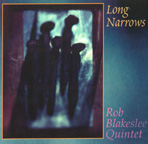 For
his second Nine Winds recording, Long Narrows, Rob Blakeslee
again asked Tad Weed and Vinny Golia (this time on soprano sax, Bb
and bass clarinet) to join him. Michael Bisio took over the bass role,
and Bob Meyer sat in the drummer's chair. As on Lifeline, this
date has a comparable amount of intensity and power. Blakeslee and
Golia jointly put on a fierce display of collective eruptiveness with
ensemble parts that launch the individual solo efforts. The song structures
have a mesmerizing quality from which each band member springs into
complex individualized improvisations. Blakeslee again mixes his approach,
pouring out smoothly flowing lines or using broken, near staccato
blurts with Weed pushing with power statements of his own. Golia also
soars on high with involved prodding by Weed. Weed is quite commanding
on piano. You can hear in his playing soft undercurrents of acknowledgement
to Horace Tapscott, another West Coast giant who failed to receive
full recognition during his time on this earth. The title song displays
very convincingly the authority with which Blakeslee plays. He opens
by reaching ultra-sonic heights while Bisio drones out dense rounds
of arco tension. The interplay is extremely involved. The music maintains
its elaborately dense posture with Golia's striking soprano solo and
the ensuing delicately laced cooperative when Blakeslee reenters.
All these songs have character, and each becomes a potent potion in
the hands of this quintet. For
his second Nine Winds recording, Long Narrows, Rob Blakeslee
again asked Tad Weed and Vinny Golia (this time on soprano sax, Bb
and bass clarinet) to join him. Michael Bisio took over the bass role,
and Bob Meyer sat in the drummer's chair. As on Lifeline, this
date has a comparable amount of intensity and power. Blakeslee and
Golia jointly put on a fierce display of collective eruptiveness with
ensemble parts that launch the individual solo efforts. The song structures
have a mesmerizing quality from which each band member springs into
complex individualized improvisations. Blakeslee again mixes his approach,
pouring out smoothly flowing lines or using broken, near staccato
blurts with Weed pushing with power statements of his own. Golia also
soars on high with involved prodding by Weed. Weed is quite commanding
on piano. You can hear in his playing soft undercurrents of acknowledgement
to Horace Tapscott, another West Coast giant who failed to receive
full recognition during his time on this earth. The title song displays
very convincingly the authority with which Blakeslee plays. He opens
by reaching ultra-sonic heights while Bisio drones out dense rounds
of arco tension. The interplay is extremely involved. The music maintains
its elaborately dense posture with Golia's striking soprano solo and
the ensuing delicately laced cooperative when Blakeslee reenters.
All these songs have character, and each becomes a potent potion in
the hands of this quintet.
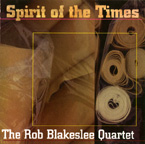 Spirit
Of The Times, Blakeslee's third leadership outing on Nine Winds
reunites him with his Lifeline rhythm team of bassist Ken Filiano
and drummer Billy Mintz. His sidekick, Vinny Golia, is also on board
playing Bb and bass clarinet exclusively. Although the previous two
recordings included the piano, Spirit of the Times does not.
The quartet maintains a constant degree of pressure to keep the music
moving despite not having the drive that came from Weed. The kindred
spiritualism between Blakeslee and Golia jumps out from the opening
lines. They intertwine yards of textured thread that blur the line
between theme and improvisation. When the full quartet enters, the
momentum builds to peak levels with personalized statements that wed
in forming beautifully sounding collective speech. Golia plays with
a combination of fervor and fury. His solos rise to ecstatic highs,
typically being prefaced by invigorating statements from Blakeslee.
Filiano and Mintz form an exceptional team. Filiano's spurring tactics
are on display throughout the recording. His arco solo on the second
tune with drum accompaniment by Mintz is a concert all to itself.
The astounding communication between Blakeslee and Golia, however,
is the most absorbing element of this emotionally charged album. Their
expressions breed off each other and expand in multiple layers of
excitement. They are in tune with each other's inner thoughts, and
the resulting energy that flows from each is full testament. Spirit
Of The Times, Blakeslee's third leadership outing on Nine Winds
reunites him with his Lifeline rhythm team of bassist Ken Filiano
and drummer Billy Mintz. His sidekick, Vinny Golia, is also on board
playing Bb and bass clarinet exclusively. Although the previous two
recordings included the piano, Spirit of the Times does not.
The quartet maintains a constant degree of pressure to keep the music
moving despite not having the drive that came from Weed. The kindred
spiritualism between Blakeslee and Golia jumps out from the opening
lines. They intertwine yards of textured thread that blur the line
between theme and improvisation. When the full quartet enters, the
momentum builds to peak levels with personalized statements that wed
in forming beautifully sounding collective speech. Golia plays with
a combination of fervor and fury. His solos rise to ecstatic highs,
typically being prefaced by invigorating statements from Blakeslee.
Filiano and Mintz form an exceptional team. Filiano's spurring tactics
are on display throughout the recording. His arco solo on the second
tune with drum accompaniment by Mintz is a concert all to itself.
The astounding communication between Blakeslee and Golia, however,
is the most absorbing element of this emotionally charged album. Their
expressions breed off each other and expand in multiple layers of
excitement. They are in tune with each other's inner thoughts, and
the resulting energy that flows from each is full testament.
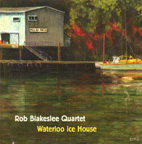 For
the recently released Waterloo Ice House, Blakeslee ventured
to Louie Records. Rich Halley plays tenor, Clyde Reed is the bassist
and Dave Storrs is the drummer. The music has many contrasts, not
only because Blakeslee's entire team changed. The recording is full
of brooding, intense feelings. Darker images constantly emerge, and
the interplay between Blakeslee and Halley is considerably different
from that with Golia. Blakeslee becomes a probing, searching soul
wandering through a maze of intertwined emotions, while Halley interjects
caustic statements that add to the weightiness of the program. The
atmosphere is kinetic, not from resounding solos that sing out with
exuberance but from restless expressions that suggest loneliness and
solitude. The lines are considerably more broken, instilling the session
with a foreboding aura. Blakeslee's compositions are again gems of
opportunity to allow the artists their individualized interpretation.
Reed does a superb job of setting the heavy tones with dense passages
that convey these ground rules, and Storrs adds shading and subtlety
with his discreet patterns. Halley conveys a sense of anger in his
playing, which further alters the course and stamps such a recognizable
change on Blakeslee's music. This recording with its altered tack
further substantiates the wide-ranging talent of Blakeslee both from
a compositional and improvisational stance. Combined with the other
releases, Blakeslee has put forth a quartet of recordings that should
establish him as a trumpeter willing and able to challenge the saxophone's
dominance on improvised music. For
the recently released Waterloo Ice House, Blakeslee ventured
to Louie Records. Rich Halley plays tenor, Clyde Reed is the bassist
and Dave Storrs is the drummer. The music has many contrasts, not
only because Blakeslee's entire team changed. The recording is full
of brooding, intense feelings. Darker images constantly emerge, and
the interplay between Blakeslee and Halley is considerably different
from that with Golia. Blakeslee becomes a probing, searching soul
wandering through a maze of intertwined emotions, while Halley interjects
caustic statements that add to the weightiness of the program. The
atmosphere is kinetic, not from resounding solos that sing out with
exuberance but from restless expressions that suggest loneliness and
solitude. The lines are considerably more broken, instilling the session
with a foreboding aura. Blakeslee's compositions are again gems of
opportunity to allow the artists their individualized interpretation.
Reed does a superb job of setting the heavy tones with dense passages
that convey these ground rules, and Storrs adds shading and subtlety
with his discreet patterns. Halley conveys a sense of anger in his
playing, which further alters the course and stamps such a recognizable
change on Blakeslee's music. This recording with its altered tack
further substantiates the wide-ranging talent of Blakeslee both from
a compositional and improvisational stance. Combined with the other
releases, Blakeslee has put forth a quartet of recordings that should
establish him as a trumpeter willing and able to challenge the saxophone's
dominance on improvised music.
Rob Blakeslee's most recent quartet endeavor is also on Louie Records
and features a twist in presentation by matching him with trombonist
Michael Vlatkovich along with bassist Reed and drummer Storrs. I have
heard an advance copy, which is titled Last Minute Gifts, and
this equally exciting performance matches the excellence of his other
recordings. It is scheduled for release in early 2001.
|
|
|
|
|

